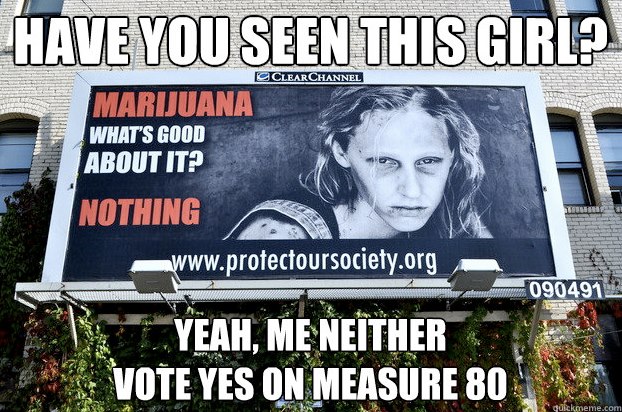
Culture wars seem to be raging around the world at the moment. To me, they all have a similar shape. They're generally about "traditional values" (the community knows what's best for you) versus "modern values" (individuals wanting to decide for themselves). To me, they're often about frozen beliefs, versus dealing with a complex, constantly changing modern world.
It might be about a 14-year-old Pakistani girl who speaks out to defend her right to go to school (and who was recently shot in the head by a Taliban gunman who wanted to stop her). Or American women who feel pushed around by right wing politicians -- including the current Republican presidential slate -- who "oppose abortions with the exceptions for rape, incest and life of the mother."
And it might be about "Just Say No" groups who want to keep marijuana, and medical marijuana use, illegal -- creating a vast black market in marijuana that results in about 800,000 arrests yearly for marijuana violations, and which costs about $50 billion/year for the states and the Feds to fight the Drug War.
I'm not totally against traditional values, but to me, the "traditionals" are almost always coming from fear. And the thing about fear is it's usually a blend of rational worries, and totally irrational terror. And unfortunately, those motivated by fear often try to control the people who are the source of their fear.
This year the marijuana issue seems to be coming to a head. Just this week, new research about the medical benefits of marijuana was presented in a D.C. Appeals Court case (Americans for Safe Access v. Drug Enforcement Administration). And on November 6, Massachusetts will decide if it will become the 18th state to allow medical use of marijuana, and voters in three states -- Colorado, Washington, and Oregon -- will decide if they want to legalize marijuana for all adults.

In Oregon, a billboard was recently put up with a very misleading face, designed to put fear into the hearts of every parent who worries about their children and marijuana. The girl looks like an angry zombie. After creating a pointed meme based on this billboard, activists were able to get Clear Channel to take down the billboards, after pointing out the shadowy nature of the funding for the billboards.
In Washington, pro-legalization forces are coming out with TV ads that feature a new face for marijuana legalization: they include testimony from a clean-cut former FBI agent, and a matronly district attorney.
And in Santee (a suburb of San Diego), Rudy Reyes, a well-known medical marijuana patient and activist, is running for mayor against a 12-year incumbent. In a recent debate, the incumbent Randy Vorpel was asked if Santee should allow medical marijuana cooperatives. Vorpel's answer didn't leave much room for disagreement: "F**k 'em." Reyes didn't take the bait, and calmly responded that the 1996 law passed by California voters requires medical marijuana to be easily available to all who need it.
I've been working on a documentary about Reyes and other medical marijuana patients in Southern California. During filming, we interviewed two anti-marijuana activists. What was interesting to me is that both related painful personal stories of drug addiction. One man told me that before going in to say goodbye to his mother on her deathbed, he got high on marijuana. The other man's daughter used meth, marijuana and other drugs. He told me that for 15 years he "slept with two dogs in our room for fear she would kill us in our sleep."
Yes, these are tragic stories. But the enlightened person's world view is not held hostage by his/her personal wounds. He doesn't have to impose his point of view on everyone else. Most studies agree that marijuana is in fact much less addictive than nicotine, alcohol, and even caffeine. Yes, every drug (legal and illegal) has some side effects and dangers. This is why the marijuana legalization propositions up for passage this November use much of their projected tax revenues for substance abuse education and treatment.
So I say, let's get beyond cloudy fearful thinking: Most people who have an abortion don't end up being promiscuous sex addicts. Most girls in developing countries who go to school don't elope with a criminal, or become a prostitute in the big city, or abandon their parents or their community. And most people who smoke marijuana never get addicted.
A healthy community (and a healthy family) should help educate the individual, including about complex situations and life choices. The goal should not be to squash people at the first sign of individual freedom or independent thought, but to help people learn how to think in the first place. A simplistic, know-it-all community takes the easy way out, turning us all into non-thinkers: Just Say No. And that's the worst tragedy.